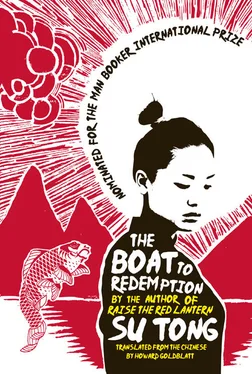This was Huixian’s moment. She was an overnight sensation. Throngs of people on the banks of the Golden Sparrow River were witness to the girl’s sudden flowering. People up and down the river were talking about a Little Tiemei who rode past them on a truck, saying that a golden phoenix had flown out of a chicken coop. The lovable Little Tiemei had actually grown up under the communal wing of the Sunnyside Fleet. Reactions to this varied on the barges. Sun Ximing and Desheng displayed the smiling air of people who were responsible for her success, while Yingtao and her family held their own wrists in sadness. Yingtao often broke out crying for no apparent reason. But my reaction was unique. I don’t know why, but I was deeply troubled. In the days just before and after National Day, we were often kept so busy loading and offloading cargo that we missed our chance to watch the parades, and all we saw was the litter left by the trucks on their joyous passage: banners that hadn’t been taken down, rubbish on the ground, and an occasional abandoned shoe. In my eyes, that litter was all a part of Huixian’s glory, which was leaving me in its wake. My sunflower had been blown away, chased by the water gourd, which remained on the water and could never catch something on land.
Keeping up my diary was demanding work. Forced to draw on what little imagination I possessed, I based my understanding of what was happening to Huixian on what I gleaned from open-air movies and newspaper clippings. I sometimes daringly dreamed up magnificent scenes and wrote them down in my notebook: ‘A clear, sunny day. People crowded the Milltown piers under the blazing red sun, in a festive, excited mood to greet Chairman Mao in their midst. He warmly asked the sunflower—’ What did he ask her? Nothing came to mind, and I didn’t dare keep writing, since I’d brought our great leader into it; if I wasn’t careful, I might write something that could be interpreted as a counter-revolutionary slogan. So I turned the page and started a new line, asking the single most important question: ‘Sunflower, oh, Sunflower, when will you return to the fleet?’
Some time around November, the parades ended and the people playing the roles of Li Yuhe and Granny Li returned to their regular jobs, he to a farm tools plant, where he repaired tractors, and she to a general store, where she sold soy sauce. But Huixian did not return. She had been discovered, like a piece of raw jade that many people wanted to cut and polish to produce a fine jewel. Song, her most ardent promoter, became her teacher, taking on the task of turning her into one of the foremost portrayers of Li Tiemei.
Huixian’s early training came with the district revolutionary opera troupe, where she was taken under the wing of the renowned actress Hao Liping. Mother had mentioned this woman in the past, referring to her as the Golden Sparrow District’s version of Comrade Jiang Qing, the Chairman’s wife. An acknowledged authority, she was the most influential and talented actress in the troupe, regardless of which heroic role she was cast to sing and dance in; by donning a fake beard, she could even take on the role of Yang Bailao in The White-Haired Woman .
This actress, this Hao Liping, was not favourably disposed towards Huixian; her assessment of the girl was diametrically opposed to that of Teacher Song and others. Finding her anything but simple and natural, she criticized her voice as substandard and found her work ethic wanting. She said Huixian butchered every song she attempted, modifying it to suit herself. After trying her best to mould the new student, she took Huixian to see Song and told him to take her back. ‘She has plenty of pluck,’ she said, ‘but not an artistic cell in her body. She’s ambitious, but has no future.’
Though not convinced that Hao Liping was being fair, Song was forced to call together a group of artistic individuals in the district to evaluate Huixian’s potential. The results were less than ideal. She had, they concluded, a natural talent for striking the right pose, but her flaws became immediately apparent when she began to sing and act. Disappointed but not ready to let that be the end of it, Song transferred Huixian to a travelling propaganda troupe attached to the cultural centre, of which he was in charge. Having her under his direct supervision, he assumed it would be smooth sailing. It was an unmitigated disaster. The other girls had grown up in the troupe and formed a perfect chorus line. If a line of poplar trees was called for, all it took was an eye signal for them to stand tall and straight; if they formed a flower garden, as soon as the plum blossom opened, the apricot and the peach, the Chinese rose, the primrose and the other flowers bloomed in perfect sequence, without a hint of dispute. But not Huixian. On stage, if all the others were poplars, she was a weeping willow; if she was a lotus, she insisted on blooming before the plum blossom. The bad habit of always wanting to do things her way, which we’d fostered in the fleet, resurfaced. In her mind, when she was on stage, she was the only one the audience was watching. The director, knowing she didn’t fit in, placed her in the least conspicuous spot in a dance. Predictably unhappy with this arrangement, she would impulsively work her way to the front to show the audience that her role was the most important one. Her fellow performers quickly ran out of patience, complaining that she was incapable of getting anything right, which then took the shine off their reputation. Whatever they did when she was on stage was a waste of effort; she was ruining their chances of winning prizes in competitions. What could she do, besides hold up a red lantern, they asked. If the leaders of the troupe were interested in training her, they should wait till the next time there was a parade and let her enjoy the limelight by standing there holding her red lantern.
Chairman Mao once said that persistence triumphs. Huixian persisted with her work in the troupe for some time, but in the end, a single blossom stands no chance against the jealousy of a garden of flowers. She persisted, but triumph eluded her in the end.
Snow fell during the New Year’s Festival of the third year. A thin layer of ice formed in the shallows of the river, and the air turned cold on the barges. Piles of snow kept the temperature low on the banks. Huixian returned. She was wearing her hair in the style of dancers in the city, with a round bun tied with a sky-blue satin band. An army overcoat hid her developing body from view. Though it was too big for her, it gave her a unique look; it was obvious that the red sweater and white scarf underneath were what she wanted people to notice. The way she was dressed reminded me a little of my mother. Was that the style of revolutionary romanticism? I wasn’t sure if I liked it or not, whether it pleased or concerned me. One thing I was sure of was that it was too early for her to have such an affected look.
The impressive manner in which Huixian came home masked the frustration, the dashed hopes we’d heard about. Zhao Chuntang himself went to fetch her in a newly purchased Jeep. She arrived in town not via the piers but via the highway. She stepped down off the Jeep, a girl proudly returning home in glory. But there was an inside story, a behind-the-scenes detail, which became a hot topic of discussion among the population. I heard lots of stories, the most believable of which was that the authorities were especially fond of this Milltown Little Tiemei, who was regularly invited to attend banquets and such. Older comrades doted on her and were reluctant to see her go. But she was simply too young for many of the things required of her, and too inexperienced. Better to send her home to grow and to train out of the limelight. Many of the leading officials, including Bureau Chief Liu, spoke on her behalf, informing people in the General Affairs Building that Huixian had a bright future, and entrusting the grassroots organization not only to look after her, but to mentor and educate her.
Читать дальше












